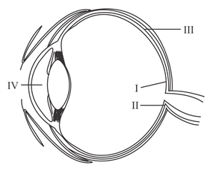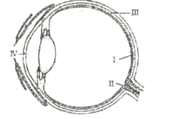Sensory Reception and Processing
Sensory Reception and Processing: Overview
This topic covers concepts such as Mechanism of Hearing, Sclera of Human Eye, Choroid of Human Eye, Retina of Human Eye, Ciliary Body in Human Eye, Lens in Human Eye, Blind Spot in Human Eye, Optic Nerves, etc.
Important Questions on Sensory Reception and Processing
Explain structure of ciliary body in human eye.
The ciliary body
Optic nerve has no role in the movement of eyeball.
Explain the path of optic nerve.
Optic nerves regulate the movement of _____ . (eyeballs/pinnae)
Which of the following cranial nerve plays an essential role in the movement of eyeball in human's body?
The first cranial nerve is optic nerve.
Rod cells are more sensitive and responsible for night vision.
Name the region of retina where rods and cones are absent. (Write the common name of the region.)
Observe the following diagram of V.S. of eye and identify the parts I, II, III and IV

Study the following statements
I) Stereocilia are long, non-motile cilia like processes and are found in the epididymis, internal ear etc.
II) Os cordis is a cartilage bone.
III) Adjacent myocardial cells are joined by gap junctions.
IV) Nissl bodies represent the smooth endoplasmic reticulum.
Identify the correct statements.
Which of the sensory organs is considered as the statoacoustic organ?
Which is the largest bone of middle ear
In humans, the tympanic membrane (eardrum) separates the tympanic cavity from
Blind spot is called so because of
A transparent crystalline structure which is held in place by ligaments attached to the ciliary body is called the
Observe the following diagram of V.S. of eye and identify the parts I, II, III and IV

Describe the blind spot in human eye.
Which one of the following is the correct difference between rod cells and cone cells of the human retina?
Photosensitive compound in human eye is made up of :
